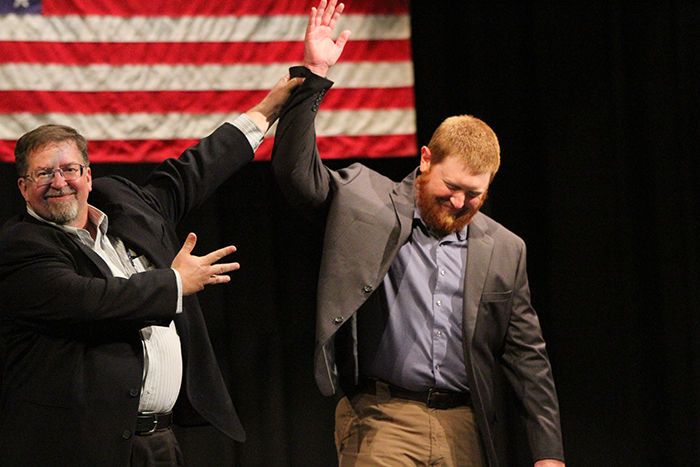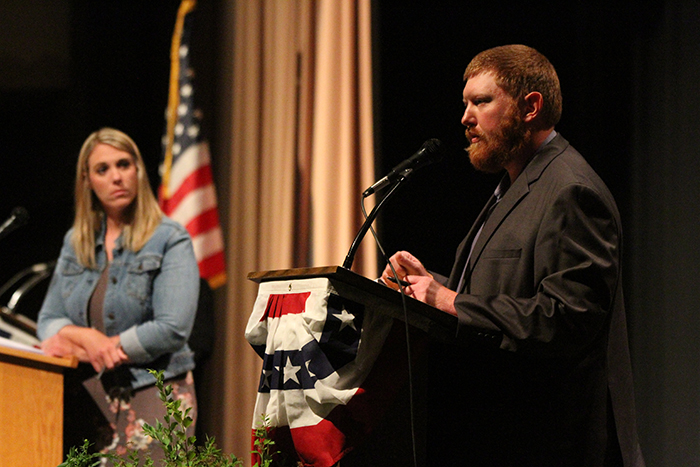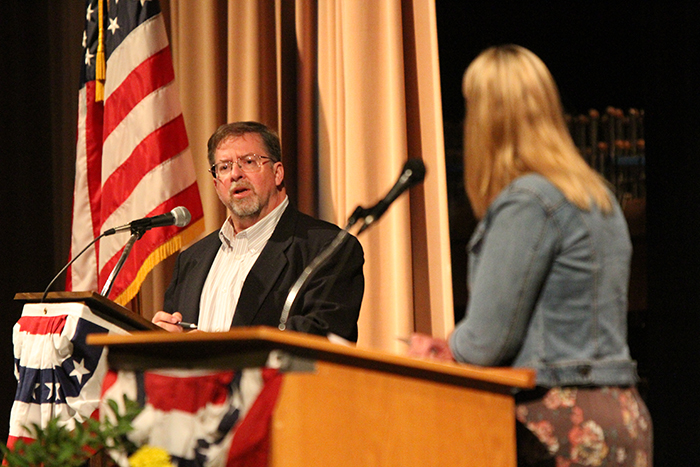Environment reigns supreme at Great American Think-Off
News | Published on June 13, 2023 at 3:48pm GMT+0000 | Author: Tucker Henderson
0McClain wins 30th annual Think-Off by contending protecting the environment is more important than economy

Doug McClain has his arm raised by Allen Taylor after he was voted as America’s top thinker during the 30th annual Great American Think-Off on Saturday night.
By Chad Koenen
Publisher
Fergus Falls resident Doug McClain was crowned as the 30th annual Great American Think-Off champion on Saturday night in New York Mills. After two hours of debate, McClain was crowned as America’s top thinker after arguing that protecting the environment was more important than protecting the economy.

In the finals, McClain stated that the benefits that the natural world provides an economic impact by offering places like the Boundary Waters that people can go and visit. He also said people need to value things like clean water to drink, clean air to breath and the health of natural places. For instance, he said if people don’t have those things the economy will essentially not matter in the end.
McClain defeated Allen Taylor of Colorado Springs, Colo. in the finals. Taylor argued that it was more important to protect the economy than the environment.
In the opening round Taylor defeated Timor Usenov, of Maple Grove, Minn., in a debate about why the economy was more important than the environment.

In his argument, Usenov argued that without a healthy economy, investing in green resources to protect the environment is not feasible.
“In order to achieve massive environmental changes, we need strong economies across the world to take collaborative action,” he said. “So, in the current state of world politics and diplomacy, it is far-fetched to assume that such action can be taken for issues as big as climate change itself. Many developing nations do not have the current systems or infrastructural capability to develop or invest in green technology or climate fighting programs. When the people are starving, fighting for jobs, and clawing their way to survival, green investments are the last worries on their minds. There needs to be a strong economic foundation.”
He also tapped on his personal experiences living in Kyrgyzstan, where he witnessed devastating environmental issues like trash littering the streets, air pollution and deforestation.
“A failing economy presents itself as one of the largest threats to humanity,” he said. “It not only exacerbates human suffering under poverty, but it extinguishes the possibility to expand and develop on domestic and global issues. By protecting the economy, we protect the current and future generations of people across the globe, by both preventing a loss of human life and creating a realistic possibility to actually alleviate our environmental crisis.”
In his opening essay, Taylor used his 1980 Chevy truck, which he dubbed as “FrankenChevy” about how much more important the economy is when compared to the environment. The truck was falling apart and needed to be replaced, but a college student at the time, Taylor said he could not get a loan because he was not financially stable. He used that example to make up the bulk of his argument that demanding something be done to save the environment without a proper plan, or stable economy, is not viable.
“Demanding that something be done without a plan invites failure,” he said. “In 2010, I worked at a metallic lead recycling facility—one considered the standard in environment protection. A new series of regulations came down that year from the county, the state and federal governments. All of those new regulations involved reporting information already being reported to nine new agencies—in different formats. People were hired to do nothing, but compile the same data, now in 18 different ways and send that same data to 18 different government agencies. My employer spent a quarter million dollars per year, improved not a single process, and had exactly zero positive effect on the environment in any way.”
Taylor said even with the best intentions, putting environment protection first has unintended consequences that could destroy an economy.
“When environmental protection takes priority over protecting the economic ability to do so, we destroy our tools and cripple ourselves with the best of intentions,” he said.
In the second round McClain defeated Gretchen Mayer, of Mansfield, S.D., in their argument that the environment was more important than the economy.
In speaking for the environment, Mayer tapped into her personal experience of looking for robins and wildlife with her children years ago. She said the family would often find things like white asparagus that would poke out of the fertile soil, but was eventually dug up by farmers so they could plant closer to the road.
“The earth is being mutilated by deafening two-story machines called excavators. They dig and shake and tear leaving in their wake an open gash of gravel and soil in search of a few ounces of gold,” she said. “Prairies are disappearing—only about two percent of the original grasslands remain. Farmers spray planeloads of weed killer on their crops and I look up and curse the sky as white clouds drift down, settling onto the earth where frogs, toads and important pollinators live—bumble bees, moths and beetles. The poison kills the ladybugs who devour the clusters of parasitic aphids that feed on leaves, stems and roots.
She went on to say that without a healthy environment there will be no where for people to go to mend their broken soul.
“An economy of goods and services did not exist until humans appeared on the earth. It is the environment that creates the competition for resources with its fountains of oil, buried gems, field of wheat and caged beef, pork and foul,” she said. “So, should it not logically follow that if you protect the environment, you also protect the economy?”
In his argument for the environment, McClain stated that the environment provides nourishment that can not be otherwise found without its protection.
“The environment existed before we did; it was not created by human beings,” he said. “The economy on the other hand, a manufactured construct, was created by us to be used by use or to use us. We are the motor of the economy, while we are but one part of the environment. The environment, does not need us to operate, and some may say it would run more efficiently without us.”
Essentially, McClain said the economy can be protected if needed at the expense of the environment, but the protection of the environment positively impacts the economy.
“Our compassion must work to ensure that people around the world are clothed, fed and sheltered, but this ‘being human’ is not dependent on the economy,” he said. “In fact, it flourishes regardless of the economy. Our protection of the environment is a vital way we can show compassion for our fellow human beings around the world.

